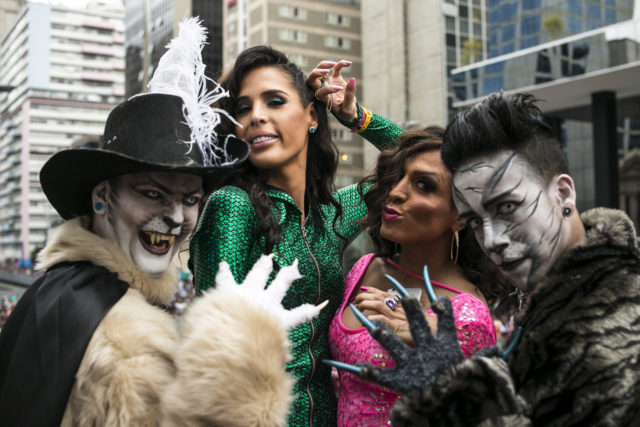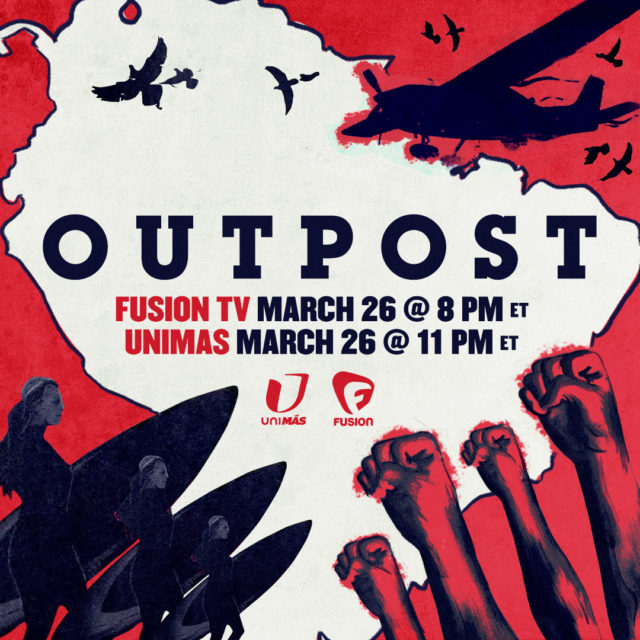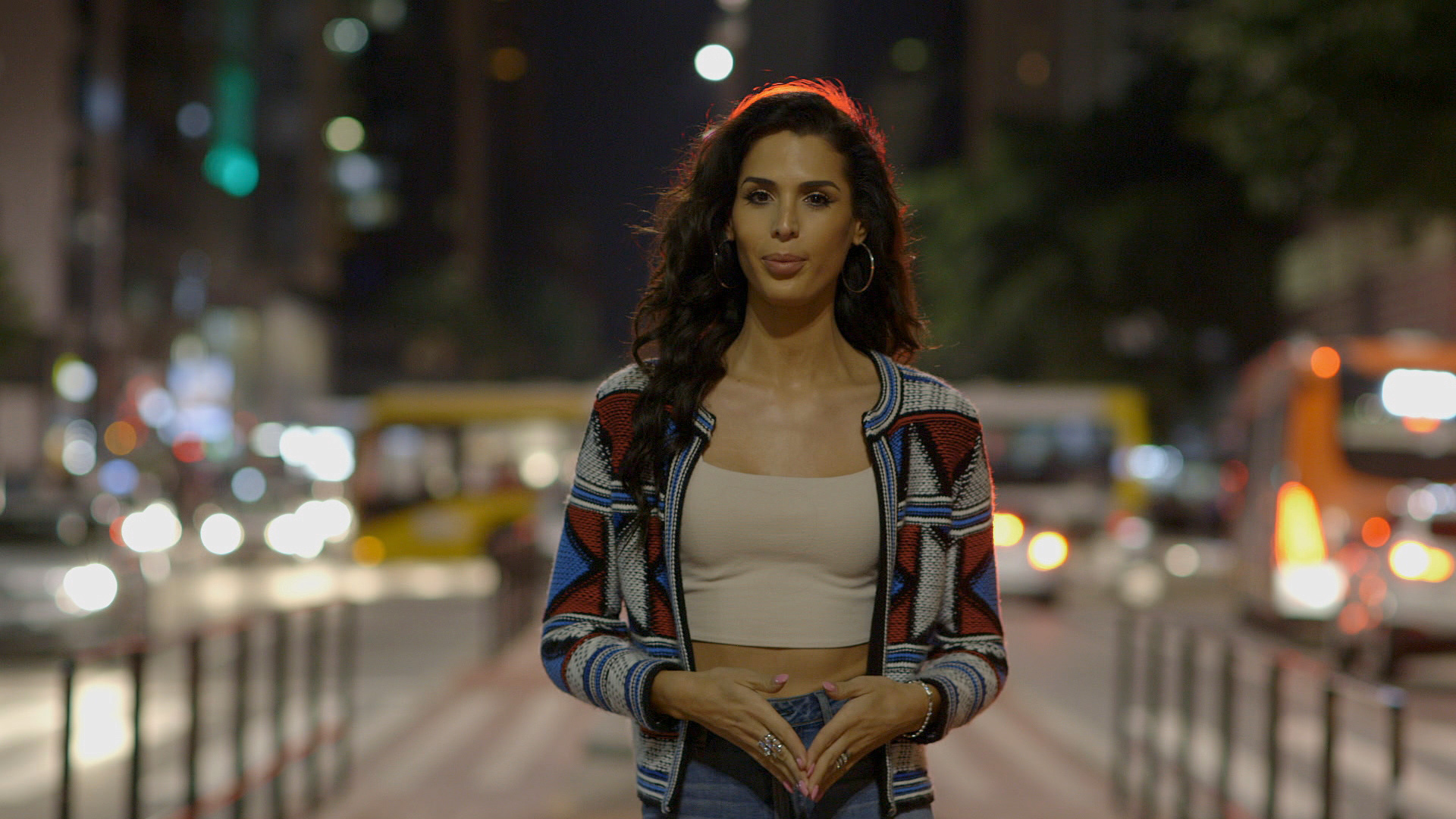Carmen Carrera is never one to shy away from the public eye. She let her fans in on her trans identity early on in her career, and has taken us all on her journey, revealing the ups and the downs.
Her most recent project features her activism for the trans community in an episode of Fusion TV’s expanded docuseries, “OUTPOST,”– premiering this Sunday, March 26. In Carrera’s episode, titled “Empowering New Voices,” she travels to Sao Paulo, Brazil: A place with one of the most celebrated annual pride parades in the world, but also the murder capital of the world for transgender people. Carrera went to Sao Paulo to meet trans women there and find out why this disparity was happening.
GO spoke with Carrera to get the scoop on her travels, activism and what we can expect from the episode airing this Sunday.

GO Magazine: I know recently Indianara Siqueira won an alternate seat on Rio de Janeiro’s municipal council. Has her progress as a trans politician helped change the minds of other local politicians?
Carmen Carrera: No, that’s the problem. What I’ve learned from going to Brazil is that I feel like government officials say they have these programs put in place to support trans people but they don’t actually provide support. It’s kind of weird – the government has programs in place for trans people to “rethink their life trajectory.” They don’t want to actually provide protections, education or services that are needed. 90% of the trans community in Brazil is involved with sex work. When in comes to gay marriage and equality, they [Brazil government officials] passed the law in 2014, they made it possible. When it comes to trans community, we don’t see that same support. There is that one program and even with that, it’s a 3 year wait list. They don’t create opportunity for trans people to thrive. The programs are contingent upon trans people “rethinking” their life. You’re not allowed to be yourself if you need assistance.
GO: What about LGBTQ organizations? Are they providing support for the trans community in Brazil?
CC: Unfortunately, it’s misguided support. A lot of it is distraction of gay scene or the groups of sex workers who basically have to work from the ground up to support themselves.
GO: How did your experience and time in Brazil empower you to continue your activism?
CC: It’s humbling to go somewhere and meet people who are limited in their resources just because of where they live. I sometimes get lost in the excitement and growth of my own career and forget that some people don’t have the same resources I do. It really put it in perspective for me. All they [trans women] really need is knowledge and inspiration. Aside form acting and modeling, this experience makes me want to pass on the knowledge even more. Continue traveling to other places. I don’t see myself as any different but I do know that I’m more fortunately. It makes me sad and I want to help out.

GO: In the episode you spend a lot of time getting to know a young trans woman who isn’t yet out to her family and you give her some great advice. What advice would you lend to trans youth right now who are coming out in Trump’s America or struggling in places like Brazil?
CC: My best advice for any trans person right now is to form your foundations first with people who love and understand you. That’s most important. And then you just have to be patient. It’s so difficult. You want to transition fast, you want to get through the hard moments so that you can just catch up to the rest if the world. But you’ve got to understand what’s happening around you. Keep a firm grasp on the life you want and work towards that.
Supportive community is what’s really going to help; if that’s not available use resources like the Trevor Project and Care Plus New Jersey. I go to Care Plus every Thursday for their trans youth support group and it’s somewhere to vent about the issues you don’t wanna bring up around people who don’t support you. To talk about your hopes and desires. Keeping it all bottled up is really intense. So having that base and center home where you can be vulnerable is so important. Not feel like you’re being judged.
GO: Do you have any suggestions or ideas for how the LGBTQ community can provide more support for members of the trans community who are sex workers?
CC: I mean, honestly, I’m not going to judge anyone’s choice of work. I just want to expand on the list of options and choices for what trans women can do. It was difficult my dad passed away and my mom being a single immigrant parent. I’m first generation America and making my family proud was a big responsibility. I have a set idea of the type of life I wanted to live.
When realized I was a part of the LGBTQ community, I wanted to model my life after the LGBTQ community. So for a little while I had to take that trip. My friends were involved with sex work and I would go to the nightclubs and help them set up their dates. After graduating college, I realized wait a minute – what more can we have? Why are we so limited in our beliefs of what we can obtain? I want to inspire and empower trans women to give them more options of the life you wanted as a child. I want trans people to know that you can have that life if you put in the work for it.

GO: How did it feel to travel to Brazil with your new passport that positively reflects your gender identity?
CC: Well honestly for me – I’m a public figure with exposure. So people know that I’m trans. They might not know by meeting me so it’s not something I have to cope with on a negative aspect. But it’s still there. When I was transitioning and I didn’t have the documentation yet, I was traveling with a friend in Columbia. We were taken aside and searched and it was so unnecessary. After completing all the things I did to get my new information, I felt safer to travel to Brazil. But I still felt the fear – it’s the murder capital for trans people. Regardless if you can tell – my identity is out there at the end of the day. I felt safe to travel but I didn’t feel safe to function.
GO: Something you mention in the series is remaining visible to support the trans community. How do you see this message continue to grow in your work as an activist?
CC: I hope that it inspired other trans people to be more open. I want being trans to just become something normal where people aren’t not shocked or taken aback by a trans person. My goal is to normalize so it takes away the pressure from these young kids. Takes away the violence and discrimination. The world a bit of a better place. Societies main struggle is accepting others who are different than you. What’s the use of fighting or misunderstanding? When you look at it with perspective – what is our purpose if we’re not inspiring young people? Through my visibility and success I hope to inspire trans people to be proud of who they are. I don’t want us to feel like we have to run and hide or not feel accepted. I want trans people to thrive.
GO: It seems not much better in the US right now for trans women of color. A lot of people in the trans community are calling this a state of emergency. How do see this docuseries lending to the healing for the trans community but also pushing for a safer future?
CC: I think that the more people will understand that this is happening all over the wold. This is a crisis. Every time I bring this up to other people they say “well, it’s just seven deaths.” But it’s not just seven deaths, it’s so specific [to trans women of color] and it’s happening so often, all over the world. I hope with this project, people will be awakened that this is a huge problem and it needs to stop. I’m not one to point fingers but I do want to create change. This [murder of trans women] is happening everywhere and it needs to end.
GO: What exciting projects do you have coming up we should keep an eye out for?
CC: I’m going be on the cover of Glassbook Magazine this summer, it’s only my second cover so I’m really excited. It’s the activist issue with a spread. Other than that, I’m working on TV and film projects right now. Miami Swim Week will come out soon and I’m also excited for that.



What Do You Think?